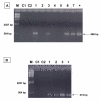Molecular and phylogenetic analysis of HIV-1 variants circulating in Italy
- PMID: 18847472
- PMCID: PMC2586622
- DOI: 10.1186/1750-9378-3-13
Molecular and phylogenetic analysis of HIV-1 variants circulating in Italy
Abstract
Objective: The continuous identification of HIV-1 non-B subtypes and recombinant forms in Italy indicates the need of constant molecular epidemiology survey of genetic forms circulating and transmitted in the resident population.
Methods: The distribution of HIV-1 subtypes has been evaluated in 25 seropositive individuals residing in Italy, most of whom were infected through a sexual route during the 1995-2005 period. Each sample has been characterized by detailed molecular and phylogenetic analyses.
Results: 18 of the 25 samples were positive at HIV-1 PCR amplification. Three samples showed a nucleotide divergence compatible with a non-B subtype classification. The phylogenetic analysis, performed on both HIV-1 env and gag regions, confirms the molecular sub-typing prediction, given that 1 sample falls into the C subtype and 2 into the G subtype. The B subtype isolates show high levels of intra-subtype nucleotide divergence, compatible with a long-lasting epidemic and a progressive HIV-1 molecular diversification.
Conclusion: The Italian HIV-1 epidemic is still mostly attributable to the B subtype, regardless the transmission route, which shows an increasing nucleotide heterogeneity. Heterosexual transmission and the interracial blending, however, are slowly introducing novel HIV-1 subtypes. Therefore, a molecular monitoring is needed to follow the constant evolution of the HIV-1 epidemic.
Figures






References
-
- Italian AIDS Operative Center Aggiornamento dei casi di AIDS notificati Italia – Dec 2006. Not Ist Sup Sanità. 2007;20
-
- Balotta C, Violin M, Monno L, Bagnarelli P, Riva C, Facchi G, Berlusconi A, Lippi M, Rusconi S, Clementi M, Galli M, Angarano G. Prevalence of multiple dideoxynucleoside analogue resistance (MddNR) in a multicenter cohort of HIV-1-infected Italian patients with virologic failure. J Acquir Immune Defic Syndr. 2000;24:232–240. - PubMed
LinkOut - more resources
Full Text Sources
Molecular Biology Databases

